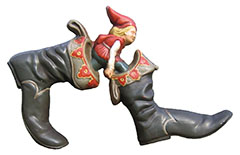 Adelbert von Chamisso (January 30, 1781 – August 21, 1838) was a German poet and botanist. He wrote Peter Schlemihl, a famous story about a man who sold his shadow.
Adelbert von Chamisso (January 30, 1781 – August 21, 1838) was a German poet and botanist. He wrote Peter Schlemihl, a famous story about a man who sold his shadow.
In the story, Schlemihl sells his shadow to the Devil for a bottomless wallet (the gold sack of Fortunatus1), only to find that a man without a shadow is shunned by human societies. The woman he loves rejects him, and he himself becomes involved in guilt. Yet when the devil wants to return his shadow to him in exchange for his soul, Schlemihl2, as the friend of God, rejects the proposal and throws away the bottomless wallet besides. He seeks refuge in nature and travels about the world in scientific exploration, with the aid of seven-league boots3. When overtaken with sickness, he is reconciled with his fellow men who take care of him, and in regard for his sickness do not look for his shadow. Finally, however, he returns to his studies of nature and finds his deepest satisfaction in communion with nature and his own better self.
The story, intended for children, was widely read and the character became a common cultural reference in many countries. People generally remembered the element of the shadow better than how the story ended, simplifying Chamisso’s lesson to the idiom “don’t sell your shadow to the Devil.”
1 Fortunatus is a tale that follows the life of a young man named Fortunatus from relative obscurity through his adventures towards fame and fortune; it subsequently follows the careers of his two sons. Fortunatus was a native, says the story, of Famagusta in Cyprus, and meeting the goddess of Fortune in a forest received from her a purse which was continually replenished as often as he drew from it. With this he wandered through many lands, and at Cairo was the guest of the sultan. Among the treasures which the sultan showed him was an old napless hat which had the power of transporting its wearer to any place he desired. Of this hat, he feloniously possessed himself and returned to Cyprus, where he led a luxurious life. On his death he left the purse and the hat to his sons Ampedo and Andelosia; but they were jealous of each other, and by their recklessness and folly soon fell on evil days.
 2 Schlemihl, a Yiddish word —and its Hebrew cognate shlumi’el—mean a hopelessly incompetent person, a bungler. Consequently, the name is a synonym of one who makes a desperate or silly bargain. Originally the name meant friend of God, Theophilus.
2 Schlemihl, a Yiddish word —and its Hebrew cognate shlumi’el—mean a hopelessly incompetent person, a bungler. Consequently, the name is a synonym of one who makes a desperate or silly bargain. Originally the name meant friend of God, Theophilus.
3 Seven-league boots are an element in European folklore. The boot allows the person wearing them to take strides of seven leagues per step, resulting in great speed. The boots are often presented by a magical character to the protagonist to aid in the completion of a significant task.